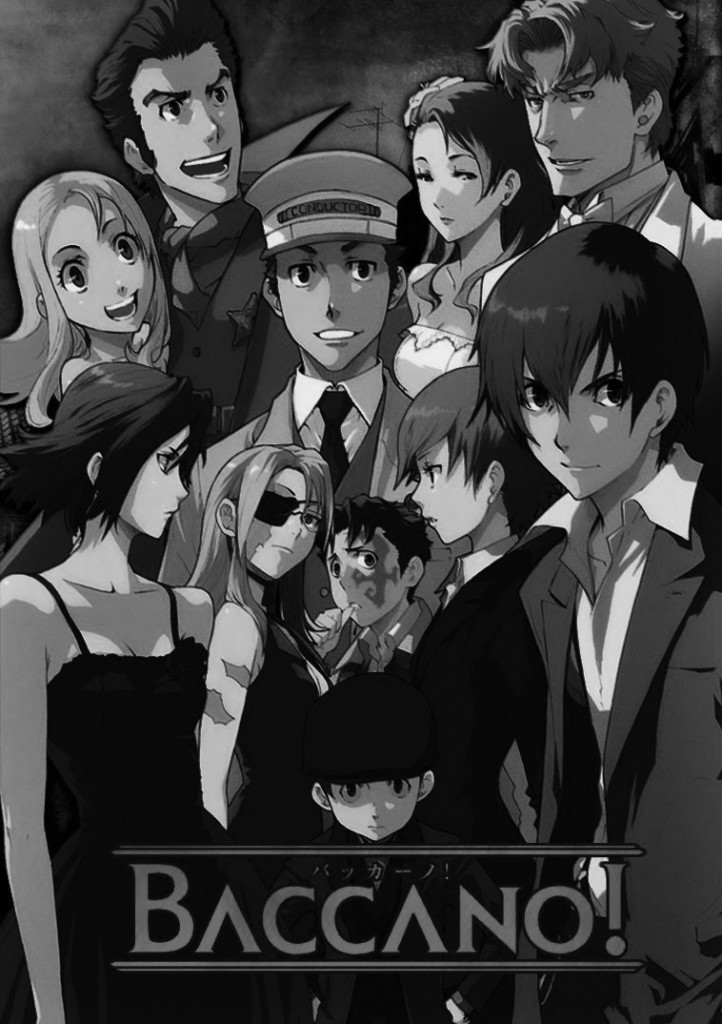
‘Baccano’ review
By Adam Tatelman, Staff Writer
2/5
After watching great anime like Cowboy Bebop and Trigun, I had high hopes for Ryogo Narita’s Baccano, which promised a Dirty ’30s setting and finger-snapping jazz soundtrack. I was hooked by the catchy opening theme and its clever homage to Snatch. What could possibly go wrong?
Baccano (Italian for “big ruckus”) has three plots that all cut together at random. The first one, chronologically, takes place in 1930 where a young mafia capo named Firo stumbles into a blood feud between ancient alchemists. The second plot, set in 1932, concerns Eve Genoard, whose older brother vanishes in the middle of a war between rival crime families. The third, and main, plot takes place in 1931 aboard a transcontinental line called the Flying Pussyfoot. Three criminal factions are competing for control of the train. The Lemures take hostages to barter for their imprisoned leader’s freedom. The Russo family demands a ransom from the train company. At the same time, a ragtag group of would-be hijackers vies to save the passengers. At the same time, a shapeless monster starts knocking people off at random.
This sounded like an Alfred Hitchcock thriller in the making: a super high-stakes standoff, awaiting an explosive conclusion. But Baccano ultimately fails to deliver because the very first episode reveals the ending.
Baccano shows many perspectives of the same events in order to manufacture dramatic tension, but it all falls flat when you know who will survive. Instead, three stories of irrelevant details compete for screen time, which kills the pacing. The characters are supposed to be bound by fate, but once causality is invoked, it doesn’t matter how many shocking revelations or tense action beats play out. It’s all preordained, so nothing is really happening.
The alchemy angle only makes matters worse. It feels silly as the connective thread in an otherwise authentic period piece. It introduces a number of immortal characters whose safety I can be even less invested in.
None of the characters develop much either. Jacuzzi learns to toughen up and fight for his friends, but the rest are little more than walking gimmicks. There’s Ladd Russo, the gleeful psychopath, as well as Isaac and Miria, the wannabe Bonnie and Clyde duo who turn all their scenes into high-energy pantomime.
These gimmicks are entertaining, but only at first. A few episodes in and every scene starts to feel the same. I don’t know why they bother with multiple accounts when so much time is wasted on static characters with no unique perspectives. All that does is make the show boring and unfocused. I felt like all the graphic violence was just there to distract me from this flaw. Perhaps that’s why the blood and guts seemed so out of place in what is otherwise a technicolour farce.
Baccano has a few good things going for it. The soundtrack is authentic, the animation crisp and kinetic, and the localization is fantastic. Between the period-accurate slang and the perfect Italian-American accents (excusing the lousy French ones), this could have been a great action-comedy. Focusing on the train robbery scenario would have created a tighter narrative focus while still allowing the multi-perspectives plot.


